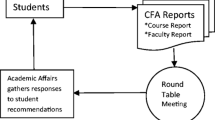Abstract
This article examines the impact of a faculty professional development effort on the understanding, confidence, and attitudes of education faculty related to program assessment activities. We applied literature on the adoption of innovations, institutional effectiveness, and professional development to a case study of a series of workshops on assessment. The results suggest that faculty members had improved skills and knowledge, understanding, confidence, and attitudes regarding assessment following the workshops. The opportunity for faculty members to collaborate with colleagues on assessment and to develop an understanding of the kinds of supports in place for assessment work were important elements in the gains.



Similar content being viewed by others
References
Berquist, W. H. (1992). The four cultures of the academy: Insights and strategies for improving leadership in collegiate organizations. San Francisco, CA: Jossey-Bass.
Birnbaum, R. (2000). Management fads in higher education: Where they come from, what they do, why they fail. San Francisco, CA: Jossey-Bass.
Bolman, L. G., & Deal, T. E. (2003). Reframing organizations: Artistry, choice and leadership (3rd ed.). San Francisco, CA: Jossey-Bass.
Boyle, B., Lamprianou, I., & Boyle, T. (2005). A longitudinal study of teacher change: What makes professional development effective? Report of the second year of the study. School Effectiveness and School Improvement, 16(1), 1–27.
Bresciani, M. J. (2006). Outcomes-based academic and co-curricular review: A compilation of institutional good practices. Sterling, VA: Stylus.
Creswell, J. W. (2003). Research design: Qualitative, quantitative, and mixed methods approaches (2nd ed.). Thousand Oaks, CA: Sage Publications.
Cronbach, L. J. (1951). Coefficient alpha and the internal structure of tests. Psychometrika, 16(3), 297334.
Ewell, P.T. (2002, April). Perpetual movement: Assessment after twenty years. Speech given to the American Association of Higher Education Annual Meeting. Boston, MA. Retrieved on August 13, 2009, from www.teaglefoundation.org/learning/pdf/2002_ewell.pdf
George, A. A., Hall, G. E., & Stiegelbauer, S. M. (2006). Measuring implementation in schools: The stages of concern questionnaire. Austin, TX: Southwest Educational Development Laboratory/SEDL.
Hall, G. E., & Hord, S. M. (2001). Implementing change: Patterns, principles, and potholes. Needham Heights, MA: Allyn and Bacon.
Murray, J. P. (1999). Faculty development in a national sample of community colleges. Community College Review, 27(3), 47–64.
Murray, J. P. (2008). New faculty members’ perceptions of the academic work life. Journal of Human Behavior in the Social Environment, 17(1/2), 107–128.
Palomba, C. A., & Banta, T. W. (1999). Assessment essentials: Planning, implementing, and improving assessment in higher education. San Francisco, CA: Jossey-Bass.
Peterson, M. W., & Vaughn, D. S. (2002). Promoting academic improvement: Organizational and administrative dynamics that support student assessment. In T. W. Banta (Ed.), Building a scholarship of assessment (pp. 26–46). San Francisco, CA: Jossey-Bass.
Rogers, E. M. (2003). The diffusion of innovations (4th ed.). New York, NY: Free.
Sahin, I., & Thompson, A. (2006). Using Rogers’ theory to interpret instructional computer use by COE faculty. Journal of Research on Technology and Education, 39(1), 81–104.
Saldaña, J. (2009). The coding manual for qualitative researchers. Thousand Oaks, CA: Sage.
Stake, R. E. (1995). The art of case study research. Thousand Oaks, CA: Sage.
Stevens, J. (1996). Applied multivariate statistics for the social sciences (3rd ed.). Mahwah, NJ: Erlbaum.
Stigmar, M. (2008). Faculty development through an educational action programme. Higher Education Research and Development, 27(2), 107–120.
Sullivan, A. M., Lakoma, M. D., Billings, J. A., Peters, A. S., & Block, S. D. (2006). Creating enduring change: Demonstrating the long-term impact of a faculty development program in palliative care. Journal of General Internal Medicine, 21(9), 907–914.
Walker, G.E., Golde, C.M., Jones, L., Bueschel, A.C., & Hutchings, P. (2007, December 14). The importance of intellectual community. The Chronicle of Higher Education, B6-B8.
Walvoord, B. A. (2004). Assessment clear and simple: A practice guide for institutions, departments, and general education. San Francisco, CA: Jossey-Bass.
Wehlburg, C. M. (2008). Promoting integrative and transformative assessment: A deeper focus on student learning. San Francisco, CA: Jossey-Bass.
Welsh, J. F., & Metcalf, J. (2003). Faculty and administrative support for institutional effectiveness activities. The Journal of Higher Education, 74(4), 445–468.
Wergin, J. F. (2005). Taking responsibility for student learning: The role of accreditation. Change: The Magazine of Higher Learning, 37(1), 30–33.
Wolverton, M., Gmelch, W. H., & Sorenson, D. (1998). The department chair as double agent: The call for department change and renewal. Innovative Higher Education, 22(3), 203–215.
Wright, B. D. (2002). Accreditation and the scholarship of assessment. In T. W. Banta (Ed.), Building a scholarship of assessment (pp. 240–258). San Francisco, CA: Jossey-Bass.
Acknowledgements
This article is based on ongoing research into the implementation of a unit-wide assessment system. We thank the faculty members who supported this research through participating in interviews and completing surveys, as well as the College of Education for funding data collection efforts.
Author information
Authors and Affiliations
Corresponding author
Rights and permissions
About this article
Cite this article
Haviland, D., Shin, SH. & Turley, S. Now I’m Ready: The Impact of a Professional Development Initiative on Faculty Concerns with Program Assessment. Innov High Educ 35, 261–275 (2010). https://doi.org/10.1007/s10755-010-9140-1
Published:
Issue Date:
DOI: https://doi.org/10.1007/s10755-010-9140-1




